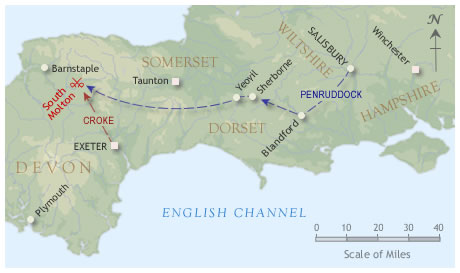Sarah-Jayne Ainsworth
[This blogpost examines the petitions written by Wiltshire woman Arundell Penruddock and her family between 1655 and 1660. These are housed at the Wiltshire and Swindon Heritage Centre and demonstrate a concerted effort firstly to try and save her husband, John, from execution following a failed uprising against the Commonwealth, and then to secure property and money for her family. It is written by Dr Sarah-Jayne Ainsworth, who recently completed her PhD at the University of Exeter.]
At the outbreak of the Civil Wars in 1642, John Penruddock and his brothers fought on the Royalist side; his siblings were killed but John rose to the rank of colonel before resigning his commission at Easter 1645.[1] The family’s loyalty to Charles I cost them dearly; parliamentary record the fines levied against John and his father for delinquency and the sequestration of their land.[2] When John senior died, his son found himself heir to a confiscated estate and was forced to spend a great deal of time and money trying to regain it.
Penruddock’s refusal to accept the new regime led him to engage with the Sealed Knot. Commissioned by Charles Stuart from exile in Paris, a series of assaults at Newcastle, York and Winchester were planned. A lack of support meant that the planned northern attacks did not take place, but, on 8 March 1655, Penruddock and his 400-strong force rode into Winchester. However, Oliver Cromwell’s spies had discovered the conspiracy and the garrison there had been reinforced. Thwarted, Penruddock headed instead to Salisbury, arriving on the 12th. Here, his men occupied the market square, commandeered horses, released prisoners willing to join them and publicly proclaimed their support for Charles Stuart. They then marched through Blandford, Sherborne and Yeovil, hoping to swell their numbers with the Royalists of Dorset and Somerset. Few responded. On the 14th March, at South Molton, Devon, Penruddock and his company were confronted by Colonel Unton Croke’s troop of horse from Exeter.[3] There was a half-hearted street fight: the insurgents fled, but Penruddock and others were captured.[4] They were taken to Exeter, incarcerated in the castle and then put on trial for treason. Penruddock’s Uprising had failed.

Penruddock’s attempts to have the charges dropped on the grounds that his actions were not treasonous because treason could only be against a King are documented in the published account of his trial.[5] Initially, both John and Arundell petition Cromwell for clemency. Penruddock begs mercy not just for his sake, but ‘for the sake of soe many Innocents his wife children and Relations who are too numerous to be made miserable by his death’ and acknowledges that ‘in your Highnesses Breath depends his Life or death’.[6] Arundell’s first petition echoes the sentiment. She accepts that her husband ‘hath justly deserved … your Highnesses most seveer displeasure’, but minimises his actions as ‘rashness and folly’.[7] Whilst, as Andrea Button notes, Royalist women petitioners sought repentance on behalf of their husbands, Arundell instead begs Cromwell to pardon John so that ‘he may live to repent and redeeme his ingratitude as well as fault’.[8] God has ‘out of his wonted mercy to you Highness [hath] frustrated their evil designes’ but she hopes that Cromwell will show his mercy and allow John to live.
Continue reading “The Penruddock Petitions: The Aftermath of a Royalist Revolt, 1655-1660”
